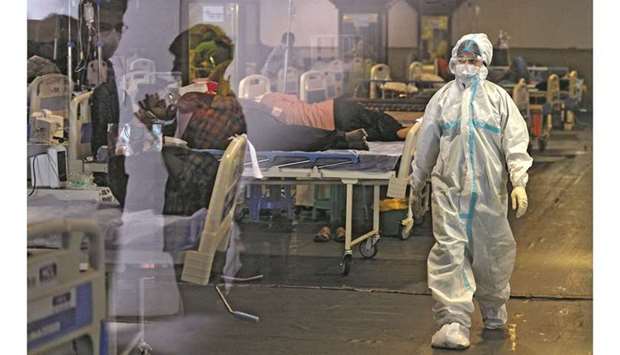The World Health Organisation yesterday said the coronavirus variant first identified in India last year was being classified as a variant of global concern, with some preliminary studies showing that it spreads more easily.
The B.1.617 variant is the fourth variant to be designated as being of global concern and requiring heightened tracking and analysis.
The others are those first detected in Britain, South Africa and Brazil.
“We are classifying this as a variant of concern at a global level,” Maria Van Kerkhove, WHO technical lead on Covid-19, told a briefing. “There is some available information to suggest increased transmissibility.” Indian coronavirus infections and deaths held close to record daily highs yesterday, increasing calls for the government of Prime Minister Narendra Modi to lock down the world’s second-most populous country.
The WHO has said the predominant lineage of B.1.617 was first identified in India in December, although an earlier version was spotted in October 2020.
The variant has already spread to other countries, and many nations have moved to cut or restrict movements from India.
Van Kerkhove said more information about the variant and its three sub-lineages would be made available today.
“Even though there is increased transmissibility demonstrated by some preliminary studies, we need much more information about this virus variant and this lineage and all of the sub-lineages,” she said.
Soumya Swaminathan, WHO chief scientist, said studies were under way in India to examine the variant’s transmissibility, the severity of disease it causes and the response of antibodies in people who have been vaccinated.
“What we know now is that the vaccines work, the diagnostics work, the same treatments that are used for the regular virus works, so there is really no need to change any of those,” Swaminathan said.
WHO director-general Tedros Adhanom Ghebreyesus said that the WHO Foundation was launching a “Together for India” appeal to raise funds to purchase oxygen, medicines and protective equipment for health workers.
Meanwhile, a growing number of current and recovered Covid-19 patients in India are contracting a deadly and rare fungal infection, doctors said yesterday.
Mucormycosis, dubbed “black fungus” by doctors in India, is usually most aggressive in patients whose immune systems are weakened by other infections.
Medical experts said they had seen a rise in cases in India in recent weeks, while the health ministry on Sunday released an advisory on how to treat the infection.
Dozens of corpses found in river
Dozens of bodies believed to be Covid-19 victims have washed up on the banks of the Ganges river in northern India, officials said yesterday. The pandemic has been spreading fast into India’s vast rural hinterland, overwhelming local health facilities as well as crematoriums and cemeteries. Local official Ashok Kumar said that about 40 corpses washed up in Buxar district near the border between Bihar and Uttar Pradesh, two of India’s poorest states. “We have directed concerned officials to dispose of all bodies, to either bury or cremate them,” Kumar said. Some media reports said the number of corpses could be as high as 100. The reports quoted other officials as saying some of them were bloated and partially burned and could have been in the river for several days.

A health worker wearing a protective gear walks past Covid-19 patients inside a banquet hall temporarily converted into a Covid care centre in New Delhi yesterday.
